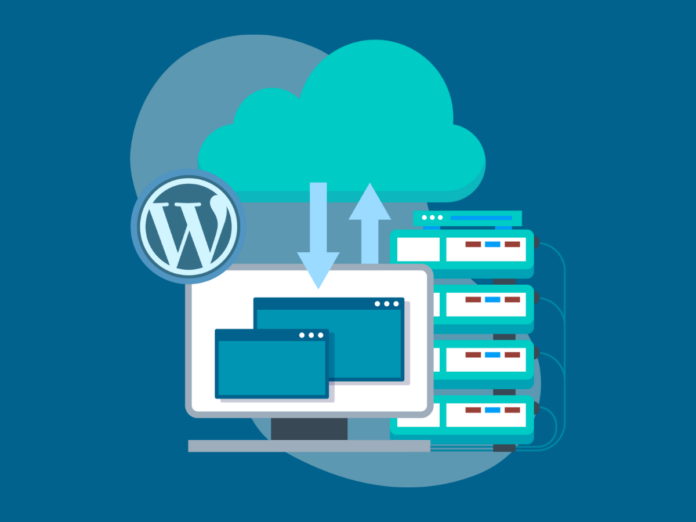If you’re thinking about creating a website, chances are you have come across WordPress. WordPress is a free, open-source content management system (CMS) that powers millions of websites across the internet. However, running a WordPress site requires a hosting service, and that’s where hosting for WordPress comes in. WordPress hosting is a type of hosting service specifically tailored for WordPress. It’s optimised for WordPress, which means it can handle the specific needs of a WordPress website better than standard web hosting.
In this complete guide, we will answer the question: What is WordPress hosting, as well as explain the differences between web hosting and WordPress hosting, discuss the benefits of hosting for WordPress, and provide answers to frequently asked questions.
Table of Contents
What Is Web Hosting?
Before diving in, it is important to understand what web hosting is. Web hosting is a service that allows website owners to store their website files on a web server that is accessible over the internet. Simply put, web hosting is like renting space on a server where your website files are stored. A web host offers a hosting environment that includes a web server, database, and other necessary components for hosting your website.
There are different types of hosting available, including shared hosting, virtual private servers (VPS), cloud hosting, and dedicated servers. The type of service you choose depends on your website’s requirements, traffic volume, and budget. For more details, check out our in-depth guide on the different types of web hosting.
What Is WordPress (WP) Hosting?
WordPress hosting is a type of web hosting specifically optimised to meet the needs of WordPress sites. This hosting is designed to support WordPress efficiently through specially configured servers. Some hosts offer managed hosting for WordPress, which means they take care of everything related to hosting your WordPress site, including backups, security, updates, and more.

Why use WP hosting?
WordPress hosting offers several benefits over regular hosting. First and foremost, it is designed to enhance the efficiency of WordPress through its server configuration. WordPress hosting provides an environment optimised for WordPress, which means faster loading times, improved security, and better overall performance.
WordPress hosting packages often come with pre-installed WordPress software, a one-click WordPress installer, automatic core and plugin updates to keep your website up-to-date, and WordPress-specific plugins and security features that help you manage your website more efficiently. This makes it easy for website owners to install and manage WordPress without the need for technical expertise.
What is managed WP hosting?
Managed hosting is a type of WordPress hosting where the hosting company takes care of everything related to hosting your WordPress site. This includes server optimisation, security, backups, updates, and more. This hosting is a popular choice for businesses or individuals who want to focus on creating content for their websites without worrying about the technical aspects of hosting.
Managed hosting typically includes advanced security features such as malware scanning, DDoS protection, and firewalls to protect your site from potential threats. This form of hosting also offers automatic updates to the WordPress core and plugins to ensure that your website is always up-to-date and secure.
What’s the Difference Between Web Hosting and WordPress Hosting?

While web hosting and WordPress hosting share some similarities, there are a few key differences. Both options provide the space and resources needed to host a website, however, WordPress hosting is specifically tailored to run WordPress, while web hosting can be used for any type of website. Hosting providers offer an environment optimised for WordPress, which means better performance, faster loading times, and improved security.
Hosting companies typically offer a broader range of hosting options, including shared hosting, VPS hosting, dedicated hosting, and cloud hosting. While these options can also support WordPress, they are not designed to handle it securely and efficiently.
Shared WordPress Hosting vs Managed WordPress Hosting: Which Is Best?
There are two types of WordPress hosting: shared and managed. When it comes to choosing between the two, it ultimately depends on your specific needs and budget.
Shared WP hosting
Shared hosting is a type of hosting where multiple websites are hosted on the same server. This hosting type is affordable, but it also means that your website shares resources with other websites on the same server, which can impact your website’s performance.
Managed WP hosting
Managed hosting is a form of hosting where the host manages all aspects of your WordPress site, including updates, security, and backups. This hosting type is more expensive than shared but offers better performance, security, and support.
Which hosting option is right for you?
The right hosting type for you depends on your website’s needs and budget. Shared is a good option if you have a small website or a limited budget. Managed hosting is more suited to a WordPress website that receives moderate to high traffic and requires better performance, security, and support. Ultimately, the decision will depend on your specific needs, budget, and goals.
Top 5 WordPress Hosting Benefits

Now that we’ve looked at the difference between shared and managed hosting for WordPress, let’s explore some of the benefits of WordPress hosting:
- Faster Loading Speeds: It offers faster loading speeds due to its optimised hosting environments, which can help improve user experience and search engine rankings.
- Enhanced Security: Most hosting plans often come with enhanced security features such as malware scanning, firewalls, and automated security updates. This helps to protect your website from cyber attacks and hackers.
- Automated Updates and Backups: Many plans include automated WordPress core and plugin updates as well as backups, which ensures that your website data is safe in the event of a data loss.
- Access to WordPress Experts: WordPress hosts typically have knowledgeable support teams who specialise in WordPress-specific issues. This can be beneficial if you have any technical problems or questions about using WordPress.
- Scalability: Most plans offer scalable hosting solutions, allowing you to easily upgrade your hosting plan as your website grows.
WordPress Hosting FAQ
Here are the answers to some other frequently asked questions about WordPress hosting:
Do you need WordPress hosting to run WordPress?
No, it’s possible to install WordPress on any web hosting service. However, WP hosting can offer many benefits and features that are specifically tailored to WordPress websites.
Can you switch from shared hosting to managed WordPress hosting?
Yes, you can switch from shared to managed WP hosting. In fact, many hosting providers, including MCloud9, offer migration services to make the process as seamless as possible.
Can you use WordPress hosting for non-WordPress sites?
While this form of hosting is configured for WordPress, you can technically use it for non-WordPress sites. However, it’s not recommended, as you’ll likely be paying for features and resources you don’t need.
What is the cost of WordPress hosting?
Hosting for WordPress can vary in cost depending on the provider and plan you choose. Generally, plans start at around R100 – R150 per month.
In Conclusion
WordPress hosting is a form of web hosting specifically tailored to WordPress. It offers a range of benefits, including improved performance, security, and reliability. Choosing the right hosting provider is crucial to ensuring the success of your WordPress site.
Investing in quality WordPress hosting can help improve your website’s speed and performance, enhance security, and provide access to specialised WordPress support. When choosing a host, it’s important to do your research and consider factors such as hosting plan features, pricing, customer support, and uptime guarantees. Don’t just go for the cheapest option – investing in a quality host can pay off in the long run by providing better technical support for you, a better user experience for your visitors and improved search engine rankings.


